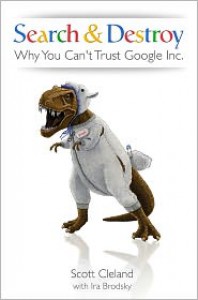Search & Destroy: Why You Can't Trust Google Inc.
 Scott Cleland has bravely done what few have the nerve to do: publicly expose the secrets of a tyrant. Google Inc is a multi-billion dollar company extending their tentacles into every possible corner of commerce and the Internet as possible, and effectively taking over. The general public as a whole does not realize the hold this seemingly innocent Internet-based company has over their personal information and the sneaky ways they gather and archive such private details of our daily lives- including, but not limited to, the websites we visit in the comfort of our own homes, the links and ads we are drawn to while Web surfing, and even our medical and health records. Aside from victimizing the general public, Cleland exposes the questionable tactics and politics they utilize to trap and take advantage of companies that purchase advertisement from Google Inc. In three parts, the author runs through the laundry list of crimes against humanity this company gets away with on a daily basis, all in the name of profit and in the effort to monopolize all of the world's information.
Scott Cleland has bravely done what few have the nerve to do: publicly expose the secrets of a tyrant. Google Inc is a multi-billion dollar company extending their tentacles into every possible corner of commerce and the Internet as possible, and effectively taking over. The general public as a whole does not realize the hold this seemingly innocent Internet-based company has over their personal information and the sneaky ways they gather and archive such private details of our daily lives- including, but not limited to, the websites we visit in the comfort of our own homes, the links and ads we are drawn to while Web surfing, and even our medical and health records. Aside from victimizing the general public, Cleland exposes the questionable tactics and politics they utilize to trap and take advantage of companies that purchase advertisement from Google Inc. In three parts, the author runs through the laundry list of crimes against humanity this company gets away with on a daily basis, all in the name of profit and in the effort to monopolize all of the world's information.The first part of this book explains why Google Inc is not to be trusted. They preach transparency and open information in every area of life, government, and business, and yet remain close-lipped about their own practices. Information such as employment statistics, information-gathering techniques, and even the locations of their servers remains unreachable for anyone outside the company (and even most employed by the company). They also fail to expose the information they steal through their search engine, applications, email service, and Street View vehicles, most of which is taken just through use of sponsored websites. Google was caught accessing personal residential wireless networks through their Street View application mapping, later reluctantly giving up the data (including user names, passwords, and personal files) for review and later stating that though the information was supposedly acquired accidently, the company would not destroy the information unless required by law. Doesn't quite sound like the innocent, trustworthy company they like to pretend to be.
Part two enlightens the reader about why Google Inc is destructive. They pick and choose which sites get displayed in their search results based solely on their own biases and loyalties, causing some to lose business due to becoming buried underneath numerous other, similar businesses. Also, advertisement price hikes on unsuspecting companies hurts business and can force companies to close or downsize to make up for their loss of revenue. Political websites are also selectively displayed, generating more support for the candidates Google supports and hurting the political careers of the rest (over 90% of Google employees are Democrats). Another potentially damaging habit of Google's is their reputation for posting or using copyrighted or patented material without permission and bracing for any backlash that may occur once the rightful owner discovers the theft of their protected material. Google Inc's deliberate, unapologetic approach to helping themselves to another's intellectual property makes the book/video/program/etc available for everyone to use with no reimbursement or credit to the rightful owner. Once discovered, the material has been available long enough to compromise the owner's exclusive rights to it and therefore loses potential revenue to bootleg copies. With no remorse, Google takes their time removing the material, but the damage is already done and irreversible.
Lastly, the author takes you into the future and gives a dim view of what the world could come to if Google gets it's way and is allowed to continue on the path they're on. Tyrants, owning all information the world can produce, a select few elite within the company deciding what information is available to the public and what they feel does not promote their best interest. All of your private information openly available to anyone with Internet access- finances, health records, contact information. Google is a fierce supported of "open" information systems.
I found this book to be very eye-opening and am grateful this information is now available to the general public. Google would like to remain seen as an innovative, trustworthy company that offers no threat to mankind, operating with the best of intentions and striving to better the world. After reading this book, readers can decide Google's level of trustworthiness for themselves. Though the author is quite repetitive with some information, his resources are reputable and from a wide selection of mediums. As Financial Times magazine said about Google Inc: "The world has every reason to applaud Google, but few reasons to trust it." I give Search & Destroy four of five stars and strongly recommend everyone read it and become educated on the issues with this company and hopefully increase their own online security.




